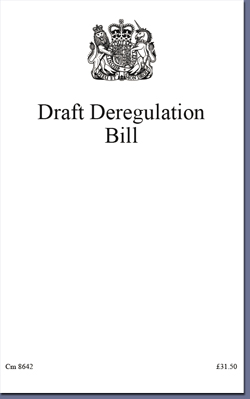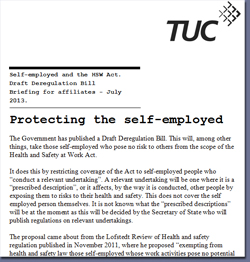 |
 |
|
The Cull On Health And Safety Legislation Now Turns To The Self Employed In keeping with David Cameron’s pledge to “kill of the health and safety culture, once and for all!” his coalition government have now published their latest attacks on health and safety at work protection legislation.
The TUC has issued a four page document detailing the elements within the Bill that damage health and safety at work protection. But tied in with the specifics of that of course are the other issues – employment protection and employment tribunal decisions – as they both impact upon the health of workers, and to their detriment if the Government have their way. Bullying, harassment, sexual harassment, victimisation – all will be allowed to take place by the employer as a result of workers having no protection at all for two years; giving a green light to employers to hire and fire at will, abuse their staff; knowing absolutely nothing will happen to them for doing so because the employee has no rights at all for the first two years of being employed by a bullying and bad employer. Work related stress is the major issue for Union Safety Reps and trade unions, second only to musculoskeletal disorders caused by work. But the result of removing self-employed people from the need to consider their own and that of their customer’s and family members if they work from home; not to mention the general public; will surely mean more unnecessary injuries, time lost through ill health and in the worst case scenario, an increase in work related deaths. As the TUC points out: “The TUC has campaigned against this proposal because it would create confusion and uncertainty in a sector which already has a much higher fatality, injury and ill-health rate.” The TUC document also goes further to explain what is actually meant by Professor Loefstedt’s Review of Health and Safety regulation published in November 2011, where he proposed “exempting from health and safety law those self-employed whose work activities pose no potential risk of harm to others”. In the opening paragraph of the TUC’s document briefing for all USR’s is explains: “The Government has published a Draft Deregulation Bill. This will, among other things, take those self-employed who pose no risk to others from the scope of the Health and Safety at Work Act. It does this by restricting coverage of the Act to self-employed people who “conduct a relevant undertaking”. A relevant undertaking will be one where it is a “prescribed description”, or it affects, by the way it is conducted, other people by exposing them to risks to their health and safety. This does not cover the self employed person themselves. It is not known what the “prescribed descriptions” will be at the moment as this will be decided by the Secretary of State who will publish regulations on relevant undertakings.” The document further explains the difference between what happens now and what is being proposed: “At present, if you are self-employed, you have a legal duty to ensure that you protect others from harm resulting from your work activity. This covers all self-employed people. It is pretty straightforward and it works. There is no confusion and it means that everyone is very clear that no-one can take risks with others safety or health, even if they are self-employed.” The TUC argues that there is no justification for this move: “The changes proposed in the Draft Bill are completely unnecessary as the only time the Health and Safety at Work Act can be used is in circumstances whereby the person does put another person at risk. If they injure another person through their work, regardless of what they may have believed beforehand, the Health and Safety at Work Act will apply.”
But even worse still: “Despite this Draft Bill, every self-employed person is still going to have to do a risk assessment to see if their work poses a risk to others and if there is no risk there is no problem, just the same as now. That will not change. What will change is the confusion and complacency that it will bring. Self-employed people will be unsure if they are covered, or presume that they are not especially if they are not on the proscribed list of occupations or sectors (presuming they know about it). Even many people that clearly do pose a danger will think that they now have nothing to worry about so will believe that there is no need for any safety precautions.” The current fatality rate of 1.2 per 100,000 for the self-employed as against 0.5 per 100,000 for employees. This will no doubt increase when this Bill adds further confusion into Health and Safety legislation. The most important is Clause 1 which removes the duty of self employed in respect of health and safety in some circumstances. This is covered in more detail in the attached briefing which also contains the wording from the draft Bill and the notes relating to the Clause. . Clause 2 is about Employment Tribunal powers and restricts their power to make wider recommendations. This could affect any dismissal cases brought by health and safety activists. You can download the full TUC briefing which explains in detail the context of the Bill, along with the draft Bill from the e-library database by using search term ‘self employed’. Source: TUC / BIS / Unionsafety |


